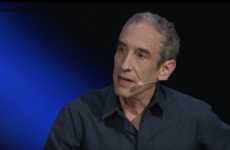
Need Inspiration?
Get inspired by 4,000+ keynote speaker videos & our founder, a top keynote speaker on innovation.
Danielle Citron Considers the Implications of Deepfake Technology
Daniel Johnson — October 23, 2019 — Keynote Trends
References: daniellecitron & ted
Danielle Citron speaks about the far-reaching impacts of deepfake technology. Danielle Citron is a law professor, as well as the vice president of Cyber Civil Rights, a non-profit organization that focuses on reducing online abuse that threatens civil rights and liberties.
Citron opens the keynote with the example of a journalist from India who was significantly affected by a viral deepfake video. The deepfake video was shared over 40,000 times and it lead to harassment and the journalist being doxed.
Danielle Citron explains that deepfake technology is a fabricated video or audio material that is created using machine learning, the content appears to be real but it is computer generated. Deepfake technology is widely available and improving at a fast pace.
Citron outlines how we are vulnerable to this type of misinformation, and online hoaxes can spread much faster than accurate information. According to Danielle Citron, this can be partially attributed to confirmation bias, which occurs when individuals seek out information that corresponds with a pre-existing viewpoint. Citron also states that social networks can often escalate issues associated with confirmation bias.
Danielle Citron goes on to outline the implications deepfakes could have on society. Deepfakes could be used to sway elections, or for corporate sabotage, or other nefarious purposes. Additionally, as the technology improves it may not be possible to tell a deepfake form an authentic video, and with rampant confirmation bias Citron states we may begin to devalue the truth.
Lastly, the keynote outlines the necessary actions that need to be taken. Laws need to be enacted to combat harassment, social media needs to remove harmful deepfake content, and society at large needs to adapt to the emerging technology.
Citron opens the keynote with the example of a journalist from India who was significantly affected by a viral deepfake video. The deepfake video was shared over 40,000 times and it lead to harassment and the journalist being doxed.
Danielle Citron explains that deepfake technology is a fabricated video or audio material that is created using machine learning, the content appears to be real but it is computer generated. Deepfake technology is widely available and improving at a fast pace.
Citron outlines how we are vulnerable to this type of misinformation, and online hoaxes can spread much faster than accurate information. According to Danielle Citron, this can be partially attributed to confirmation bias, which occurs when individuals seek out information that corresponds with a pre-existing viewpoint. Citron also states that social networks can often escalate issues associated with confirmation bias.
Danielle Citron goes on to outline the implications deepfakes could have on society. Deepfakes could be used to sway elections, or for corporate sabotage, or other nefarious purposes. Additionally, as the technology improves it may not be possible to tell a deepfake form an authentic video, and with rampant confirmation bias Citron states we may begin to devalue the truth.
Lastly, the keynote outlines the necessary actions that need to be taken. Laws need to be enacted to combat harassment, social media needs to remove harmful deepfake content, and society at large needs to adapt to the emerging technology.
6.2
Score
Popularity
Activity
Freshness

















